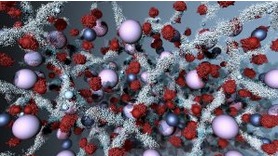Why study Materials Science and Engineering?
Whether it’s in sports, prosthetics, the automobile industry, clothing or electronic components, materials play a predominant role everywhere and are constantly changing!
Scientific and technological production know-how has brought us today to the era of materials that are “made to spec”, developed speficically for a particular application. The future will certainly open the doors to “intelligent” materials that will know how to modify their properties in response to external conditions.

An architect of matter…
Studies at EPFL will cover materials as diverse as polymers, ceramics, metals and alloys, optical and electronic materials, composites, and living materials.
You will learn to understand the structure of material down to the atomic scale! In fact, it’s at this scale that the engineer works to manipulate matter, in order to obtain the properties that he or she is looking for at the macroscopic scale: varying the composition of alloys, making inclusions, imposing a heat treatment to obtain a particular crystalline structure…
These processes are carried out using the latest techniques such as eletron microscopy, and spectroscopic measurements, and processed using sophisticated software: you can thus understand with precision the relationship between the microstructure of the material and its performance. This is a fundamental aspect of the modern approach to materials science.
From microstructure to manufacturing
But developing high performance materials is not everything. You also have to think about fabrication techniques and cost considerations, which are critical for a product to make it to the indistrial market.
As an engineer, you will always take four main areas into consideration: Performance goals; choice of material with the desired microstructure; production techniques; and cost effectiveness.
Meanwhile, you always keep in mind the life cycle of the material, which includes not only the ecological constraints on its fabrication but also the possibilities of recuperation or recycling after its first use. The idea of sustainability is an important part of our educational program.
Career possibilities
You will find possibilities in companies whose vocation is specifically tied to materials, where materials are developed and designed: the metalllurgical industry, polymer synthesis, composite manufacturing, or ceramics.
Materials specialists are also actively sought in high-tech industries where materials play a critical role. Examples are the aeronautical and space industries, biomedical and biotech industries, sports, electronics, photonics and microengineering.
See also: which job?
Study program
The basic first year study program in math and physics is the same in all four sections of EPFL’s School of Engineering, making it possible for you to easily change sections after your first year.
- Brochure: Découvrir la Science et Génie des Matériaux (Discover Materials Science – french only, pdf)
- Further information on Bachelor and Master studies in materials.
- General information on studies at EPFL:
